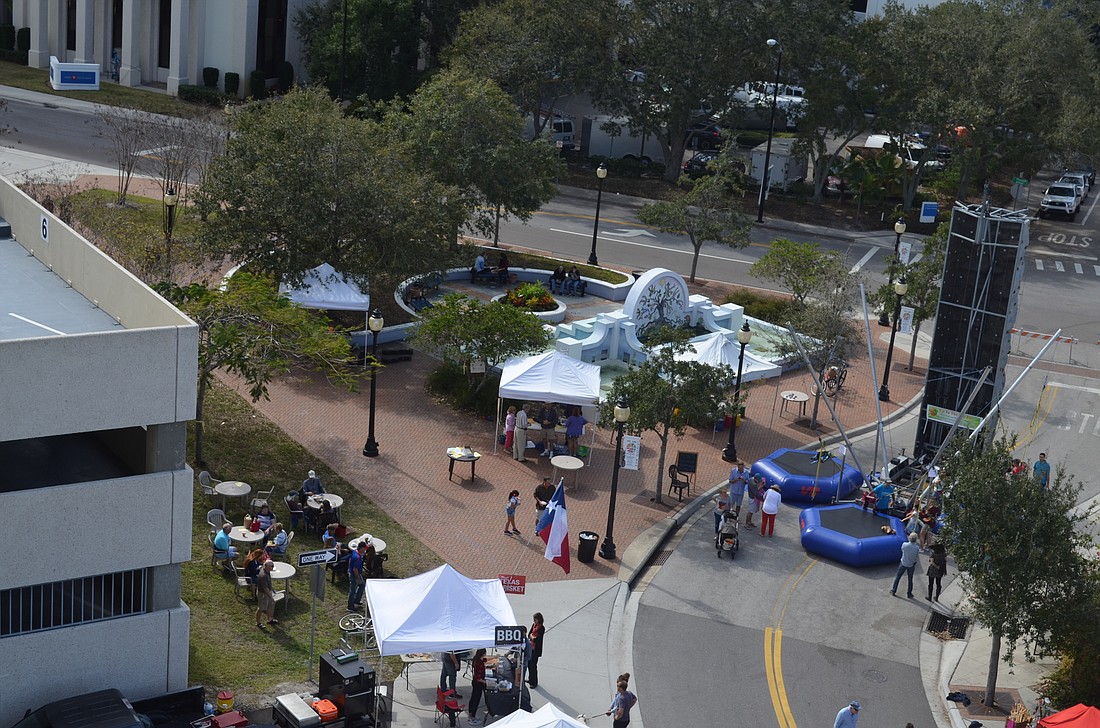- April 18, 2024
-
-
Loading

Loading

For more than a year, a group of citizen activists has rallied around the cause of saving Pineapple Park, fighting the proposed sale of a piece of land adjacent to the public space.
On Monday, the City Commission voted 3-1 to approve the sale of that land to commercial real estate firm Hembree and Associates for $260,000. In doing so, officials who supported the deal expressed a similar sentiment — they believed a new building on the property would help save Pineapple Park.
The rhetoric highlighted a divide between those who prioritized preserving downtown green space and those who believed a development would bring energy to a struggling park. Although the stakes might seem small — a two-story building on a 5,049-square-foot property along Lemon Avenue — the issue has inspired strong feelings on both sides.
Proponents of the sale, including the buyer, argued the proposal was a sensible move from an urban design perspective. Urban planner Andres Duany recommended a similar liner building in front of the Northern Trust bank parking lot in his 2001 downtown master plan.
As a result, the strip of grass next to the park was largely insignificant, they said. Commissioner Liz Alpert called the grassy area residents were fighting to preserve “crummy.” Hoyt Architects designer Chris Gallagher, who worked on the Hembree and Associates proposal, said the existing configuration went against the recommendation of most planning experts.
“Build to the sidewalk line — do not leave an area of grass between the building and the sidewalk,” Gallagher said. “You want the pedestrians to walk right up to your front door.”
The owners of nearby businesses spoke of a problem with large gatherings of vagrants and illicit behavior at Pineapple Park. Placing a business in close proximity to the park could help discourage that behavior, they said. Developer Mark Kauffman, who is partnering with Hembree and Associates on the building, said preserving the status quo would just leave the park in its current disappointing condition.
“That’s the question,” Kauffman said. “Do we want a larger park that is quiet, or a smaller park that is animated?”
Opponents of the sale saw that as a false choice. Pineapple Park has only deteriorated over the years because the city has let it fall into a state of disrepair, they said. The artwork on the mermaid fountain that anchors the park is fading, even though citizens donated $27,500 to the city specifically for the preservation of that amenity. If the city wanted to, it could invest in the park irrespective of a sale.
Although no plans have been finalized, Hembree and Associates have discussed placing café seating near the park in conjunction with the new building. Jude Levy, a leading opponent of the sale, was particularly wary of letting a restaurant open in such close proximity to the park.
Three of the six downtown “pocket parks” — Links Plaza, Lemon Avenue Mall and Little Five Points — serve as frontage for restaurants. In those parks, Levy said, the priority has shifted from serving the public to accommodating the nearby business. The city removed trees from Links Plaza because they were blocking commercial signs, and the benches disappeared from the Lemon Avenue Mall following complaints regarding gatherings of homeless individuals.
Levy fears the same thing could happen at Pineapple Park, pointing to the purchaser’s criticism of the park’s current configuration as evidence.
“The park is his — he’s already redesigned it,” Levy said. “The only people who would be able to use that park are customers.”